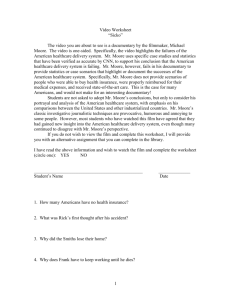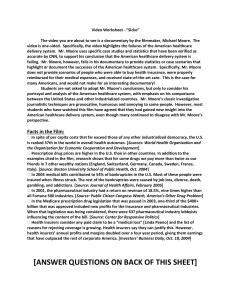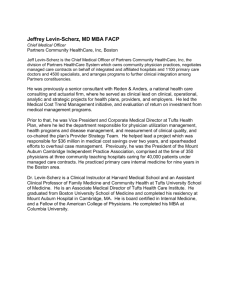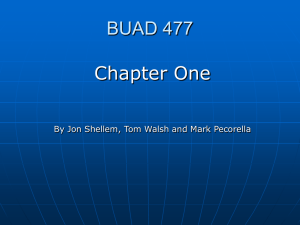Document 11165694
advertisement
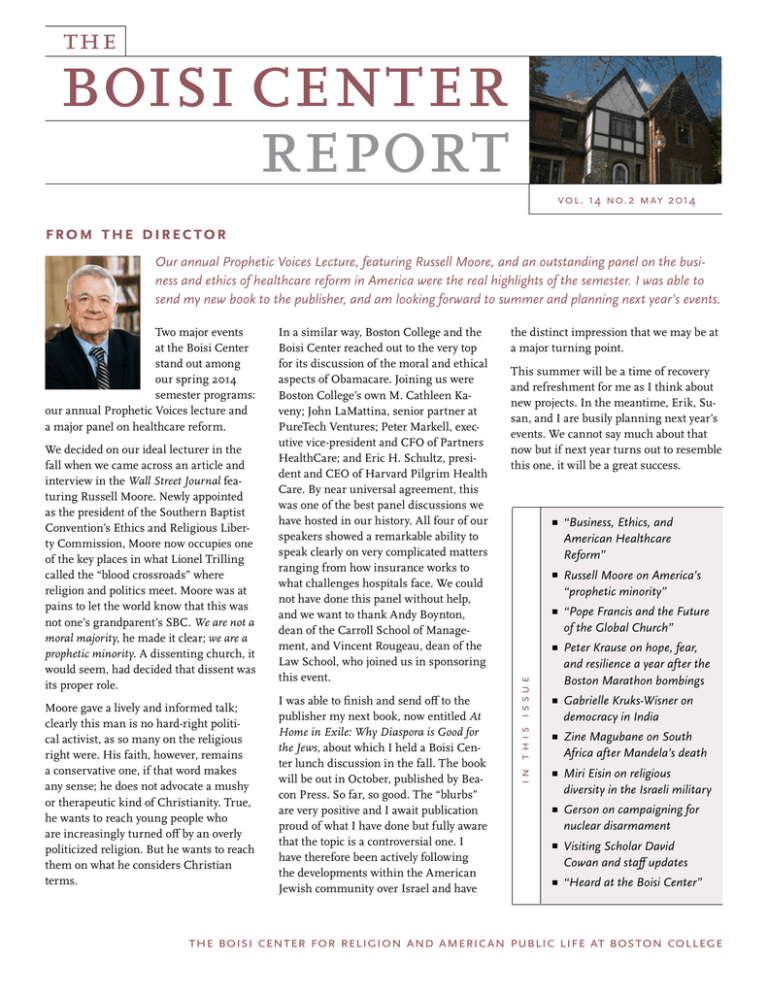
the boisi center report vol. 14 no.2 may 2014 from the director Our annual Prophetic Voices Lecture, featuring Russell Moore, and an outstanding panel on the business and ethics of healthcare reform in America were the real highlights of the semester. I was able to send my new book to the publisher, and am looking forward to summer and planning next year’s events. We decided on our ideal lecturer in the fall when we came across an article and interview in the Wall Street Journal featuring Russell Moore. Newly appointed as the president of the Southern Baptist Convention’s Ethics and Religious Liberty Commission, Moore now occupies one of the key places in what Lionel Trilling called the “blood crossroads” where religion and politics meet. Moore was at pains to let the world know that this was not one’s grandparent’s SBC. We are not a moral majority, he made it clear; we are a prophetic minority. A dissenting church, it would seem, had decided that dissent was its proper role. Moore gave a lively and informed talk; clearly this man is no hard-right political activist, as so many on the religious right were. His faith, however, remains a conservative one, if that word makes any sense; he does not advocate a mushy or therapeutic kind of Christianity. True, he wants to reach young people who are increasingly turned off by an overly politicized religion. But he wants to reach them on what he considers Christian terms. In a similar way, Boston College and the Boisi Center reached out to the very top for its discussion of the moral and ethical aspects of Obamacare. Joining us were Boston College’s own M. Cathleen Kaveny; John LaMattina, senior partner at PureTech Ventures; Peter Markell, executive vice-president and CFO of Partners HealthCare; and Eric H. Schultz, president and CEO of Harvard Pilgrim Health Care. By near universal agreement, this was one of the best panel discussions we have hosted in our history. All four of our speakers showed a remarkable ability to speak clearly on very complicated matters ranging from how insurance works to what challenges hospitals face. We could not have done this panel without help, and we want to thank Andy Boynton, dean of the Carroll School of Management, and Vincent Rougeau, dean of the Law School, who joined us in sponsoring this event. I was able to finish and send off to the publisher my next book, now entitled At Home in Exile: Why Diaspora is Good for the Jews, about which I held a Boisi Center lunch discussion in the fall. The book will be out in October, published by Beacon Press. So far, so good. The “blurbs” are very positive and I await publication proud of what I have done but fully aware that the topic is a controversial one. I have therefore been actively following the developments within the American Jewish community over Israel and have the distinct impression that we may be at a major turning point. This summer will be a time of recovery and refreshment for me as I think about new projects. In the meantime, Erik, Susan, and I are busily planning next year’s events. We cannot say much about that now but if next year turns out to resemble this one, it will be a great success. QQ QQ QQ QQ in this issue Two major events at the Boisi Center stand out among our spring 2014 semester programs: our annual Prophetic Voices lecture and a major panel on healthcare reform. QQ QQ QQ QQ QQ QQ “Business, Ethics, and American Healthcare Reform” Russell Moore on America’s “prophetic minority” “Pope Francis and the Future of the Global Church” Peter Krause on hope, fear, and resilience a year after the Boston Marathon bombings Gabrielle Kruks-Wisner on democracy in India Zine Magubane on South Africa after Mandela’s death Miri Eisin on religious diversity in the Israeli military Gerson on campaigning for nuclear disarmament Visiting Scholar David Cowan and staff updates “Heard at the Boisi Center” the boisi center for religion and american public life at boston college business, ethics and american healthcare reform A panel of experts from the healthcare industry and a BC theologian convened at the business school in April to discuss both practical and ethical concerns involved in healthcare reform in America. have a right to basic healthcare. The panel agreed, though, that what constitutes “basic health care” is still a matter of intense debate in this country. The panel discussed whether implementation of the ACA marks a shift toward the ethical understanding Kaveny laid out. It seemed generally agreed that while the new law moves in the direction of positive reform, it leaves many problems unaddressed while also creating new problems. Owens pushed the panel to say what an appropriate arrangement of cost-sharing of healthcare expenses across society would be, but panelists were not able to reach a consensus on the question. The April 24 panel discussing the business and ethics of American healthcare reform (from l to r): Erik Owens, Peter Markell, Eric Schultz, John LaMattina, and Cathleen Kaveny On April 24, the Boisi Center hosted a panel on the business and ethics of healthcare reform. Boisi Center associate director Erik Owens moderated the panel of prominent guests: Cathleen Kaveny, the Darald and Juliet Libby Professor of law and theology at Boston College; John LaMattina, a former senior vice president and president of research and development at Pfizer and currently a senior partner at PureTech Ventures; Peter Markell, executive vice president, chief financial officer, and treasurer of Partners HealthCare Systems; and Eric Schultz, president and chief executive officer of Harvard Pilgrim Health Care. Each panelist brought a unique and exceptionally well-informed perspective to the practical and ethical issues surrounding the Affordable Care Act (ACA, commonly known as Obamacare) and healthcare reform more generally. The panel sought to rise above the hyperbolic language of partisan politics in order to provide a more nuanced assessment of the challenges and future of American healthcare and insurance 2 the boisi center report reform. Markell noted that the difficulty of addressing high costs stems from an imbalance in the financial structure: three percent of the population drives fifty percent of healthcare costs. Speaking from his perspective in the insurance industry, Schultz added that the ACA is counting on young, healthy people to contribute to the insurance market at rates disproportionate to their use of healthcare. LaMattina explained that the high costs of drug prices reflect the expensive research and development required to bring a drug to market. Kaveny supplemented the discussion of practical business concerns by outlining a Catholic ethical perspective. She spoke of the long history of community-based healthcare within the Catholic tradition, and reminded the audience that many of Jesus’s miracles were focused on healing the sick and marginalized members of society. Catholic-run hospitals have become one of the most important providers of healing and treatment in the United States. The Catholic moral tradition has long maintained that individuals Following the discussion, members of the audience—including those viewing the live broadcast online—had the opportunity to ask the panel specific questions. The panelists and audience discussed difficulties raised by Medicare guidelines based on outdated life expectancy projections. Additionally, the panel agreed that the politicization of healthcare has prevented the adoption of effective solutions to the rising costs and need for healthcare and insurance. By bringing together business, ethical and theological concerns about a crucial topic, this terrific conversation served as a perfect closing event of the year. www.bc.edu/boisi-healthcare Cathleen Kaveny, the Darald and Juliet Libby Professor of Law and Theology at Boston College america’s prophetic minorit y Russell Moore spoke about the new role for evangelicals in today’s culture war—one that recognizes its minority status as counter-cultural and keeps its sights always on God’s kingdom. On April 2, Russell Moore captivated the crowd in Gasson 100 with his vision of the evangelical community as a “prophetic minority” amidst a secular culture, as he delivered the Boisi Center’s 13th annual Prophetic Voices lecture. The lecture series honors people who have drawn upon the prophetic traditions of their faith communities to challenge the consciences of all who hear them. Moore, head of the Southern Baptist Convention’s Ethics and Religious Liberty Commission, is one of the country’s most visible and prominent evangelical leaders. His impeccably delivered Prophetic Voices lecture intrigued audience members of all faith traditions and inspired a robust question and answer session with supporters and critics alike. Moore began his lecture with a personal narrative, recalling his time as a Cub Scout seeking the God and Country badge. While working toward the badge, he asked the pastor at a local church whether Christians could be possessed by demons; the pastor replied that not all of the Bible should be taken literally. For Moore, this was his conversion moment, the instant he experienced a pull to a Bible-based Christian life. Southern Baptist congregants, Moore explained, are a narrative-driven people; they experience God through personal connections, moments of conversion to their faith. Moore Russell Moore delivering the Boisi Center’s 13th Annual Prophetic Voices Lecture Russell Moore, president of the Southern Baptist Ethics & Religious Liberty Commission, and Boisi Center director Alan Wolfe fielding questions from the audience realized as a child that earning the God and Country badge was parallel to being a “good citizen” in the American context, devoid of specific Christian convictions. It was a way to preserve Bible Belt Christianity, making it broad enough to allow political pluralism to coexist with Christian morality. Against the backdrop of secular society, Moore feels that now, more than ever, the individuals who attend church are those who truly believe in its message. Gone are the days where Church membership was a ticket to social acceptance and economic prosperity in America. Nominal, cultural, God-and-Country-badge Christianity is too shallow, he argued; it is part and parcel of the secular culture that presently dominates our society. Today’s culture war will not be fought by the majority, but rather by a minority of true believers. The shift from a majoritarian self-identity, which was key in the old culture wars, to a minority identity will ultimately benefit the SBC by strengthening the prophetic voice of the community and re-centering it on Gospel truths. Moore analogized the new culture war to the difference between Merle Haggard and Bob Dylan: both have complex lyrics, but where Dylan speaks for today’s liberal mainstream, Haggard’s is a conservative counter-cultural voice: “We don’t smoke marijuana in Muskogee/ We don’t take no trips on LSD/ We don’t burn no draft cards down on Main Street.” The prophetic minority must be like Haggard in a culture increasingly consumed by Dylan’s ideals, Moore said. The minority must be engaged in the political arena, yet with the understanding that they are first citizens of the kingdom of God, and second, citizens of the earthly kingdom. As Moore closed his speech, “We’re for God and country, yes, but Jesus taught us to seek first the kingdom and His righteousness. We may not be a moral majority, but Jesus told us not to expect to be a moral majority. Broad is the path to destruction; narrow is the way He has called us to.” www.bc.edu/boisi-moore the boisi center report 3 pope francis and the future of the global church The Boisi Center hosted a panel of experts in February to examine the dynamic first year of Francis’s papacy, and what challenges they expect lie ahead for the new pope. One year into his papacy, Pope Francis continues to surprise Catholics and non-Catholics alike with his dynamic leadership and focus on the poor. On February 25, the Boisi Center co-hosted a panel with the Church in the 21st Century Center that explored the Francis papacy thus far, and expectations for its future. Boston College theology professor M. Shawn Copeland moderated María del Mar Muñoz-Visoso, of the USCCB, speaking on the first year of the Francis papacy a panel of experts: Francesco Cesareo, president of Assumption College; María del Mar Muñoz-Visoso, the U.S. Council of Catholic Bishops’ executive director of cultural diversity; and BC professor Richard Gaillardetz, the Joseph Professor of Catholic Systematic Theology. Addressing a packed room in Gasson Hall—as well as viewers of the live-broadcast on the Internet—the panel covered topics ranging from the pope’s cultural heritage to the historical context for understanding the continuity and change of Francis’s papacy. Cesareo pointed out that popes in the past hundred years have been remarkably consistent in advancing reform within the boundaries of tradition. Copeland cited Pope John Paul II in noting that the media hype around Francis is not without precedent. Gaillardetz argued that Francis provides a new lens for reading Catholic doctrine and the second Vatican Council. Munoz-Visoso explained that as the first pope from the global south and the first Jesuit pope, Francis brings a unique emphasis on mercy in action that reflects his education in liberation theology. His Latin American heritage is reflected in his desire to build a stronger community dialogue in the Church and have physical contact with the people he serves. The panel expected that the pope’s biggest challenges ahead lie in reorienting the Church’s bureaucracy and clergy to better serve the people of the world, and reopening a dialogue with those who have been marginalized and distanced from the Church. They agreed that Francis’s emphasis on a greater acknowledgment of human dignity provides an important basis for addressing the Church’s challenges. www.bc.edu/boisi-francispapacy democracy in india What factors predict whether citizens in India will demand services of their local governments—and is the high-incidence of claim-making a positive sign for Indian democracy, or a symptom of deeper problems? On a snowy February day, BC political science professor Gabrielle Kruks-Wisner spoke about democracy in rural India to an engaged audience of students, professors, and community members at the Boisi Center. Kruks-Wisner focused her discussion on the fieldwork she had conducted in Rajasthan, India, where she performed 400 qualitative interviews and 2,210 surveys over a period of eighteen months. Through this research, she sought to ascertain how rural citizens feel about the state and how they make claims for basic public services like water and electricity. Kruks-Wisner found that three-fourths of those interviewed and surveyed make claims, a figure that far surpassed what democratic theory predicts. Individuals make these claims through a plethora of avenues, including Gram Panchayat (local government), parties, bureaucracy, village associations, caste associations, NGOs, and prominent individuals. She found no statistical difference between classes or castes in the incidence of claim-making, but did find that gender was significant, as men are more likely to make claims than women and wealthy women are less likely to make claims than poor women. To account for her findings, Kruks-Wisner theorized that exposure beyond one’s immediate community will broaden one’s access to avenues for claim-making, ability to make effective claims, and expectations of how a claim will be received. She determined that socio-spatial exposure is a key driver of claim-making incidence and repertoire. At the conclu- BC political science professor Gabrielle Kruks-Wisner speaking at the Boisi Center sion of her presentation, Kruks-Wisner posed a question for the audience to contemplate: is this high incidence of claim-making indicative of active citizens in a robust democracy or of active citizens facing a democratic deficit? www.bc.edu/boisi-gkw 4 the boisi center report terrorism and the boston marathon Terrorism aims to inspire fear, but Peter Krause explained why, in fact, there is much reason for hope in the wake of last year’s attack, and why community resilience and cohesion are the best responses to such tragic events. On April 15, 2013, two bombs exploded at the finish line of the Boston Marathon, killing three spectators and injuring nearly 265 others. In reaction, Boston College political science professor Peter Krause wrote a stirring letter to the The Heights urging the BC community to respond with resilience and solidarity. On the anniversary of the bombings, the Boisi Center invited Krause to expand BC political science professor Peter Krause speaks about hope, fear and resilience a year after the Boston Marathon bombings upon his call to hope and resilience, drawing upon his scholarly expertise in political violence and security. He spoke to a packed audience in Higgins Hall on the evening of April 8. Krause began by noting that terrorism seeks to inspire fear through apparently indiscriminate violence. But we shouldn’t overstate the threat inside the U.S., where more people have been killed by lightning strikes since 2002 than terrorists. Most domestic terror attacks have come from “lone wolf” actors, not global organizations like al-Qaeda, and they have not forced significant political concessions. The Boston Marathon bombing, Krause argued, was a particular failure because it neither changed American foreign policy nor ruined the beloved event. Quite the opposite: the marathon will now be run every year as a symbol of resilience and hope. Indeed, resilience counteracts the fear that terrorism seeks to instill. Community cohesion prevents alienation and reduces the root causes of terrorism by building social bonds that we can draw upon as we cope with trauma or debate how to enact sounder security policies. From the heroic reactions of first responders to the inspiring stories of survivors like BC alumna Brittany Loring, Boston exhibited impressive resilience in the wake of last year’s bombings. Krause encouraged the audience to continue building hope and resilience by serving the communtiy, meeting new neighbors and friends, learning more about terrorism and foreign policy, and remembering the names of the bombing victims. Making good on his 2013 promise, Krause successfully completed the 2014 marathon less than two weeks later. www.bc.edu/boisi-krause south africa after mandela In the wake of Nelson Mandela’s passing, South Africa is entering a new era. BC sociologist Zine Magubane discussed what she saw as the country’s most pressing concerns at a Boisi Center lunch in March. On March 19, BC sociology professor Zine Magubane, a native of South Africa, spoke at the Boisi Center about her home country’s contemporary challenges. The luncheon continued a conversation began at the Boisi Center’s advanced screening of the biopic “Mandela: Long Walk to Freedom” at the Coolidge Corner Theatre in early December, coincidentally on the very day Nelson Mandela died. Magubane explained that South Africa’s most pressing issues concern the relationship of sexual equality, gender equality, religion, traditional culture, and public life. South Africa’s constitution seeks to protect both human rights and the rights of traditional culture—goals that sometimes conflict. Women’s rights are protected, for example, as are the rights of gays and lesbians. (In fact, South Africa legalized same-sex marriage before the United States did.) Yet in the name of traditional culture, these rights are being undermined. The practice of ukuthwala is a poignant example: what had been a rite of marriage negotiated between families has become a practice of kidnapping young girls and marrying them to adult men. Similarly, the widespread sexual violence against women and the “corrective rape” of lesbians (of which President Zuma has himself been accused) undermines the law’s efforts. South Africa is in a position to act as a leader on these issues in Africa, where human rights are increasingly being trampled in the name of culture. Uganda recently declared homosexuality illegal; Senegal and Nigeria are contemplating similar steps. Traditionalists argue that BC sociology professor Zine Magubane speaking at a Boisi Center lunch in March efforts to protect women and sexual minorities are impositions of Western values, but many South Africans have stood up for these protections—rural women who organize against the absolute rule of the traditional leadership councils, for example—and there is the hope that these voices will win out in the next decade. www.bc.edu/boisi-magubane the boisi center report 5 religious diversit y and military service Israel’s religiously and ethnically diverse military highlights the virtues of modernity as well as tensions that can arise when it is confronted with traditional values. The Boisi Center’s second lunch event of the semester featured retired Israeli colonel Miri Eisin, who spoke about religious diversity in the Israeli army. In seeking to be both a liberal and a Jewish state with a diverse citizenry, Israel faces many instances of rights in conflict. Its military is a poignant microcosm: it is a place where Retired Israeli colonel Miri Eisin speaking about religious diversity in the Israeli military Israeli society’s diverse components are able to interact intimately, and because of this, it can also highlight stark differences among its different groups. Eisin explained that the military is comprised of Jewish, Christian, Druze, and Muslim Israelis. Most soldiers are conscripted, while some volunteer. Accommodations are made for each group’s Sabbath and holy days. Non-Jewish soldiers serve alongside Jewish ones and can be found in all ranks. Jewish Israelis differ by religiosity—secular, traditional, Modern Orthodox, and Ultra-Orthodox—as well as heritage. The main divisions along these latter lines are between those of European descent (Ashkenazi), Middle Eastern descent (Sephardi), Ethiopian descent, and the wave of immigrants in recent decades from the former Soviet Union. Founded by secular Ashkenazim, the Israeli military has always been egalitarian. Women have served and been considered equal to men. The military has also always been a place where new immigrants and the poorer segments of society are acculturated to Israeli society; the military is where “Israel tries to fix itself,” Eisin said. Eisin worries, though, that the increasingly Orthodox nature of the military threatens its egalitarian character. The Modern Orthodox are disproportionately represented in the military. The Ultra-Orthodox are losing their exemption from military service, but are refusing to serve in close proximity with female soldiers and officers. These tensions highlight a difficulty in Israel’s identity as both a Jewish and modern liberal state. www.bc.edu/boisi-eisin nonviolent campaigning for nuclear disarmament Joseph Gerson, of the American Friends Service Committee, spoke about campaigning for nuclear disarmament, the power of grassroots efforts, and his Jewish and Quaker influences at a Boisi Center lunch on January. On January 30, Joseph Gerson visited the Boisi Center to speak about his work at the American Friends Service Committee (AFSC). Since 1976 Gerson has organized initiatives to advance nuclear disarmament and abolition, working closely with Japanese hibakusha (victims of atomic bombings in Hiroshima and Nagasaki) and others around the world affected by nuclear testing. Gerson described the AFSC’s Quaker-based commitments to human dignity, nonviolent resistance, and international justice—and engagingly recounted how these values squared with his Jewish heritage, his engagement with Buddhism, and his work in the Civil Rights and Vietnam-era peace movements. Gerson’s work with AFSC highlights the power of ordinary people to assert their 6 the boisi center report rights and overcome political obstacles. In 1979, for example, Gerson and his colleagues became involved with the Nuclear Freeze Movement, which called on the United States and Soviet Union to adopt a mutual halt on nuclear weapon testing, production and deployment. Thanks to successful organizing and teamwork, 330 towns in New England had voted for the freeze by 1982, when a million people traveled to New York to join the largest peace march in U.S. history. Nuclear weapons continue to pose a threat today, Gerson reminded the audience. Since the Nagasaki bombing, the United States has threatened to use nuclear weapons over thirty times. The AFSC is currently preparing for the 2015 Nuclear Nonproliferation Treaty (NPT) Review Conference and is lobbying the Joseph Gerson of the American Friends Service Committee speaking at the Boisi Center Obama administration, which plans to gradually modernize the U.S. nuclear arsenal. In the lively discussion following his talk, Gerson addressed questions about his religious influences, Northeast Asian peace movements, and the Middle East. www.bc.edu/boisi-gerson boisi center visiting scholar: david cowan David Cowan joined the Boisi Center as a visiting scholar during the spring 2014 semester. The Boisi Center was pleased to host visiting scholar David Cowan during the spring 2014 semester. Cowan is a senior tutor in politics and religion at King’s Evangelical Divinity School, and an approved tutor at the University of St. Chester, both in the U.K. In addition, he Boisi Center visiting scholar David Cowan presenting on theological discourse in an age of social media has over twenty-five years of experience working as a communications advisor for companies and organizations throughout the world. At the Boisi Center, Cowan researched diplomacy and communicating religion in American foreign policy, with a focus on Christianity and Islam. His latest book, Strategic Internal Communication, is also being published this spring. Cowan headlined two Boisi Center events this semester. At a March lunch talk he explored how new technology and social media affect discourse on matters of religion and faith. In April he lectured at the business school about business ethics in Saudi Arabia, drawing from his own long experience as a communications consultant in the gulf state. www.bc.edu/boisi-cowan research staff updates ▪▪ Undergraduate research assistant Wilco Carey is a rising senior, majoring in political science. This summer he will work at Labaton Sucharow, LLP, in New York City, and begin research for his honors thesis at the Center for International Cooperation at New York University. ▪▪ After he graduates in May with a B.A. in international studies and psychology, undergraduate research assistant Lee Hill will travel to Germany for a year-long professional exchange fellowship (CBYX) that includes university study and an internship with the German government. ▪▪ Graduate research assistant Yael Levin Hungerford, a Ph.D. candidate in political science, will be busy on her dissertation on the epistemology of Charles S. Peirce this summer. She looks forward to returning to the Boisi Center next year. ▪▪ Undergraduate research assistant Therese Murphy will graduate in May with a B.A. in political science, and is pursuing a career in the federal government. ▪▪ Undergraduate research assistant Mary Popeo will graduate in May with a B.A. in international studies. She will intern over the summer at the Japan Chair for the Center for Strategic and International Studies. In August she will transition to working as a Resident Assistant at Showa Boston, a satellite campus of Showa Women’s University in Tokyo, while continuing to work with the American Friends Service Committee’s Peace and Economic Security Program in Cambridge. the boisi center for religion and american public life 24 Quincy Road Chestnut Hill, MA 02467 tel: 617–552–1860 fax: 617–552–1863 email: boisi.center@bc.edu web: www.bc.edu/boisi boisi center staff alan wolfe director erik owens associate director susan richard administrative assistant yael levin hungerford graduate research assistant wilco carey lee hill therese murphy mary popeo undergraduate research assistants Follow us on Facebook (facebook.com/boisicenter) and Twitter (@boisi_center) to stay abreast of Boisi Center news and events. For complete information and resources on all our events, including audio and video recordings, transcripts, interviews, photos, bibliographies and more, visit our website, www.bc.edu/boisi. the boisi center report 7 THE BOISI CENTER FOR RELIGION AND AMERICAN PUBLIC LIFE non-profit.org U.S. postage paid boston, ma Boston College permit 55294 140 Commonwealth Avenue Chestnut Hill, MA 02467 USA ADDRESS SERVICE REQUESTED heard at the boisi center “Evangelicalism is still Protestant, and resolutely so, but we’ve been able to work together, starting with the pro-life movement, in a way that has caused Evangelicals and Catholics to form deep, deep alliances in the public square. I think the relationship between Evangelicals and Catholics has never been better.” - Russell Moore, April 2, 2014 “The basics for anybody working out of a Catholic tradition is the dignity of the human being as made in the image and likeness of God. A dignity that takes seriously human beings, not just as souls that are encased in bodies, but as embodied souls and as people living a mortal life who are vulnerable and can suffer.” “There is no decent argument [for maintaining nuclear weapons] because the use of these weapons is beyond abominable. . . . Nuclear weapons are fundamentally evil, and there is no legitimate argument for their use.” - Joseph Gerson, Januar y 13, 2014 “South Africans are all too aware that civil wars can rage in places for years and years, and nobody bothers to look them up or care. Nelson Mandela made the apartheid system something that people were morally outraged about, something that people who lived very far from South Africa were willing to make sacrif ices for.” - Zine Magubane, March 19, 2014 - Cathleen Kaveny, April 24, 2014 the boisi center report 8
